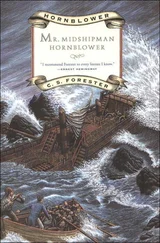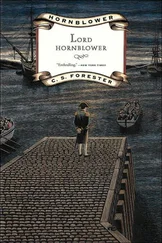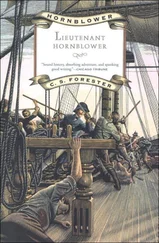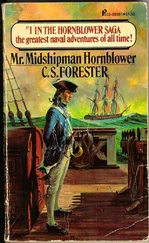Cecil S. Forester
Hornblower’s Charitable Offering
HMS Sutherland of two decks and seventyfour guns, Captain Horatio Hornblower, was on her way north from Gibraltar to her rendezvous in the Western Mediterranean. To port lay the coast of Spain; to starboard, and barely in sight, just peeping over the horizon, lay the hilltops of one of the Balearic Islands, Ibiza. Spain was now an ally of England, and it was no business of the Sutherland ’s to intercept Spanish trade or fight Spanish ships of war. Only the French were now enemies, and the French conquest of Spain had not progressed as far south yet as Valencia. It was to take a hand in the struggle in Catalonia that the Sutherland –at least so Hornblower suspected—was being sent north. Meanwhile he had little enough to worry him; a full crew, a wellfound ship, and nothing special to do until he reached his rendezvous. It was a period of transition, from one duty to another, and Hornblower revelled in the feeling of suspended animation and freedom. The Sutherland was laying over her ponderous bulk as she stood to the north closehauled to a fine easterly wind, and Hornblower paced his deck breathing deep of the crisp air and the healing sunshine.
It was the lookout at the foretop masthead who broke into the happy neutrality of his mood.
“Deck, there! If you please, sir, there’s something adrift right ahead; might just be wreckage, sir—can’t rightly tell yet.”
“Right ahead?”
“Aye aye, sir. We’re coming right up to it. Might be a raft, sir—think I can see a man—two men, perhaps, sir.”
There was an obvious explanation of the presence of a raft with men on it at sea in wartime—they might be the survivors of a battle to the death, here where the struggle for the mastery of the sea was being fought out. The Sutherland could run down to investigate without fear; there was a curious shifting sensation in Hornblower’s skull when he thought of the numerous inventors who were putting forward suggestions by which small boats could explode by charges of gunpowder against the side of a ship of the line. If ever they should succeed in their wild schemes the day of the battleship’s magnificent security would be over and instead the utmost caution would be necessary in approaching strange objects. But that was all nonsense, of course, and Hornblower shrugged it away from him carelessly; the ridiculous train of thought had occupied his mind during all the minutes necessary to raise the strange object to within sight of the deck.
“It’s a raft, sure enough, sir,” said Lieutenant Bush, glass to eye, and gazing across the sunlit water. “There’s one man waving, and I think there’s another one there, too.”
“Heave to when you get to wind’ard of her,” ordered Hornblower.
Bush took the Sutherland up close to the strange object, and hove to neatly.
“Queer sort of raft,” he said, peering over the dancing water as the Sutherland ’s leeway carried her down to it.
It was nothing more than a couple of logs bound crudely together; the waves broke over it so that the two men on it were to some extent always submerged. One man was kneeling, holding a crude paddle in his hand, while the other lay with occasionally even his head buried under the water which washed over his body.
“Heave ‘em a line,” said Hornblower.
But even the man who was kneeling was too weak for the deftlycast rope to be of use to him. He fumbled with it and lost his grip, his head falling forward with exhaustion. The quarterboat had finally to be hoisted out and the two men brought on board in a bos’un’s chair swung from the mainyard arm. They lay there brown and naked, like the Indians of San Salvador, and most desperately emaciated; every bone was standing out clear and well defined, as though straining against the leathery skin stretched over it. Their long lank hair and beards dripped water on the deck. One lay motionless, the other held out a feeble hand to them as they stared down at them; with a croaking voice he pointed down his throat.
“Thirsty, poor devil,” said Bush; a gesture from Hornblower had already sent one of the hands running for water.
The castaways drank eagerly, and to Hornblower and Bush it was as if a miracle were being performed before their eyes, almost like the raising of the dead, to see the astonishing effect of the water upon them. They revived magically; the one who had lain upon the deck, and whose head had had to be supported to allow him to drink, sat up. A death’s head smile split his lean face.
“I expect they’re hungry as well,” said Bush. “They look as if they might be.”
It only called for a nod from Hornblower for somebody to go and seek for food for them.
“Who are you?” asked Hornblower.
“François,” said the stronger one. He had blue eyes which looked oddly out of place in his brown face.
“Frenchies, by God!” said Bush.
“Where do you come from?” asked Hornblower, repeating himself in limping French when he saw he was not understood.
The blueeyed one extended an arm like a stick towards the Balearics to windward.
“Cabrera,” he said. “We were prisoners.”
Hornblower and Bush exchanged glances and Bush whistled—Bush could at least understand the gesture and the first word of the reply. Cabrera was a previously uninhabited islet which the Spaniards were using as a camp for their French prisoners of war.
The darkeyed castaway was speaking rapidly in a hoarse voice.
“You won’t send us back there, monsieur?” he said. “Make us your prisoners instead. We cannot—”
He became unintelligible with weakness and excitement. Bush, observant as usual, was yet puzzled by what he could see.
“I can understand their being thirsty,” he said, “but they couldn’t have got as thin as that just coming from Cabrera. They could have paddled that raft of theirs here in a couple of days, even without a wind.”
“When did you leave Cabrera?” asked Hornblower.
“Yesterday.”
Hornblower translated to Bush.
“That sunburn of theirs is months old,” said Bush. “The fellows can’t have worn a pair of breeches in weeks. There must be funny doings in Cabrera.”
“Tell me,” said Hornblower to the castaways, “how did you become—like this?”
It was a long story, the longer as it was interrupted while the castaways ate and drank, and while Hornblower translated the more sensational parts to Bush.
There were twentythousand of the poor devils—mainly the army which had surrendered at Baylen, but prisoners taken in a hundred other skirmishes as well—who had annoyed their Spanish captors inexpressibly while they were kept on the mainland by their continual attempts to escape. Finally the Spaniards had taken the whole twentythousand and dumped them down on the island of Cabrera, a mere rock of only a few square miles. That had been two years ago; there was no need for any Spanish garrison on the island itself—British sea power made it impossible for any French ship to attempt a rescue, and there was nothing with which to make boats except for rare driftwood. For two years these twentythousand miserable wretches had lived on the rock, scraping holes for shelter from the summer sun and winter storms.
“There are only two wells, monsieur,” said the blueeyed Frenchman, “and sometimes they run dry. But often it rains.”
Hornblower’s mathematical mind dealt with the timeproblem of supplying twentythousand men with water from two wells. Each man would be lucky if he got one drink a day, even if the wells never ran dry.
Of course there was no fuel on the island—not one of the twentythousand had seen a spark of fire for two years, and no clothing had survived two years of exposure and wear.
Читать дальше









